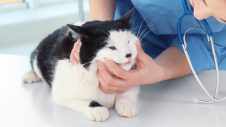Why should I take my cat to the vet?
Cats generally don’t love travelling in the car, so many cat owners are reluctant to visit their vet. However, there are several things we can do to make the journey less stressful so that your cat doesn’t miss out on the health care it deserves.
Often, having a veterinarian perform a physical examination, where they can see, listen to, and feel your pet, can help identify problems while they are small. This results in a healthier, more comfortable pet, with fewer costs for you in the long run!
So, what can be addressed by going to the vet?
Weight management and nutrition advice: With the increase in indoor cat ownership, we also see an increase in obese pets. Being overweight can be strongly correlated with suffering from diabetes, urinary tract disease, joint disease and heart disease.
Weight loss can often be a consideration, too. Weight loss can be an early indicator of thyroid disease, kidney disease, cancer and hormonal diseases such as diabetes.
Having a veterinary professional assess your pet’s weight can be really helpful. Often, when we see our pets every day, the weight can creep up (or down!) and is hard to notice in the bustle of life. Your vet will be able to help you choose a diet that suits your cat’s lifestyle.
Dental disease: Just like humans, cats suffer from dental disease. They develop plaque & tartar, get tooth abscesses, fracture teeth and develop resorptive lesions (which are similar to human cavities). As you can imagine, this is painful for the cat. Many cats will adjust how or what they eat to manage the pain and will rarely complain to you about it. Looking inside your cat’s mouth is often difficult at home, so having your vet do an oral assessment is often the best way to get the dental attention your cat deserves. Your vet will be able to advise you on the best dental care, diets and treats for your cat.
Behavioural help: One of the most common reasons cats are left at shelters is inappropriate behaviour. This is often related to urine spraying or urinating in inappropriate places. No one likes cat urine up the wall or on the bed! Your vet can help you determine the cause of these behaviours and discuss treatment options. Often, if addressed early, these behaviours can be well managed.
Vaccinations and parasite prevention: Vaccinations and parasite prevention are important parts of keeping our pets healthy. Your vet will be able to discuss with you the vaccination and parasite prevention schedule most appropriate to your pet, taking into consideration your pet’s lifestyle (indoor vs. outdoor), diet choices (commercial vs. home-cooked vs. raw), age, and concurrent health concerns.
Address any questions you may have: This is a perfect opportunity to ask any questions you may have about your cat’s health
Preparing for your visit

So that your cat’s visit to the vet is a positive experience for you and them, we request that you make an appointment by phoning us directly or booking online. This will minimise any waiting time and also give you the opportunity, when phoning, to book with your preferred veterinarian.
We understand that when visiting the vet, new smells, sounds, people, and other animals can worry your cat. Below are some tips for reducing your pet’s stress:
- Leave the carrier open at home for a few days prior to the visit. This will allow your cat to explore and become familiar with the carrier.
- Line the carrier with something soft like a towel or bed.
- ‘Feliway’ spray the carrier prior to putting your cat inside to alleviate stress.
- If your cat does not enter the carrier, calmly place them inside.
- If your cat is reluctant to travel, wrap them gently in a towel that has your cat’s scent or a pheromone spray (Feliway).
- Place a towel over the carrier so they can’t see out to help relax your cat.
- Secure the cat carrier on the back seat of your car with the seatbelt or against the front seat, and cover it with a towel.
- Drive smoothly, without loud music, talking to your cat in a soothing voice – the calmer you are, the less anxious your cat will be.
- If possible, keep windows closed for extra safety.
- When you arrive at the clinic, place the carrier in the waiting room away from dogs and facing away from other cats.
- Bring some treats to reward good behaviour.
Our teams at Greencross Vets aim to make your pet’s experience as positive as possible. We believe our genuine love for animals doesn’t go unnoticed by your pet. Contact your local Greencross Vets if you need to book a health check for your cat.

 Greencross Vets
Greencross Vets 









